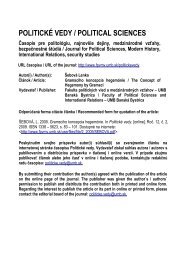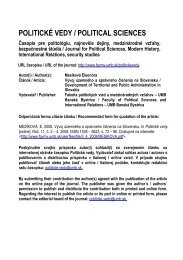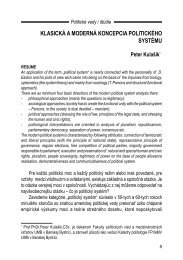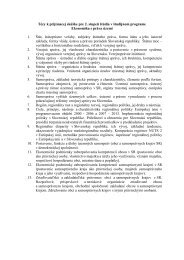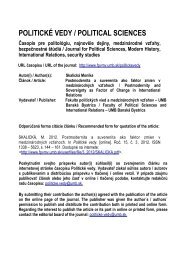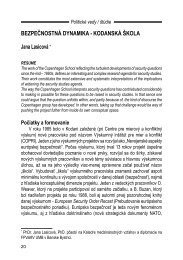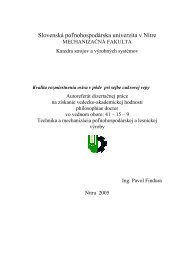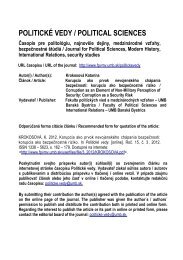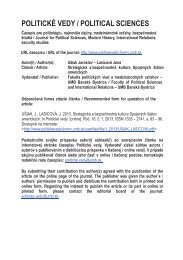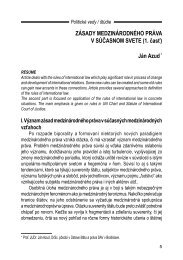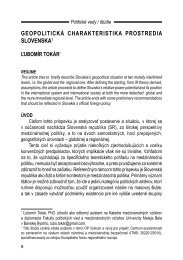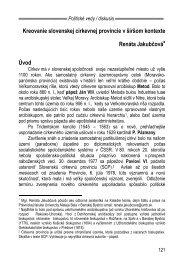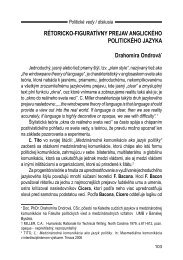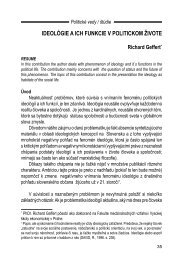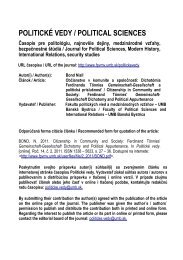MRAVNÃ VÃCHOVA V Å KOLÃCH NA SLOVENSKU A V ZAHRANI ÄÃ
MRAVNÃ VÃCHOVA V Å KOLÃCH NA SLOVENSKU A V ZAHRANI ÄÃ
MRAVNÃ VÃCHOVA V Å KOLÃCH NA SLOVENSKU A V ZAHRANI ÄÃ
You also want an ePaper? Increase the reach of your titles
YUMPU automatically turns print PDFs into web optimized ePapers that Google loves.
ANTHROPOLOGY AND ETHICS<br />
(Hungarian pedagogical innovation for teaching Ethics)<br />
István KAMARÁS<br />
Pannon Egyetem Budapest, Hungary,<br />
Antropológia és Etika Tanszék, e-mail: kamarasi@upcmail.hu<br />
Our observations show that in today's Hungary the natural process of passing on social standards has<br />
become distorted, people's relation to values has become unstable in the recent decades. The rising<br />
generation has not been prepared for finding its way independently among the more and more<br />
complicated social conditions.<br />
The 10-to-18-year-olds today know considerably more about the mineral resources of South America<br />
than about feelings and emotions, they know more about free valences than about the determined<br />
nature and the freedom of the human being. They can reduce an equation comparatively well, but they<br />
know little about when man is in good condition. They know something about the health, but barely<br />
any about the wholeness of man; fairly much about being well off, but far less about being well. A 17-<br />
18-year-old-student may even be able to give the chemical formula of ethyl-methyl-keton but knows<br />
almost nothing about the components of personality. In spite of the fact that brave and promising<br />
initiatives occasionally turn up to meet the long-felt need of human studies, in most schools the human<br />
is still notoriously absent.<br />
What image of man is offered and cultivated by the official and hidden curriculum of our national<br />
primary and secondary education, by the ethos of schools and teachers To what extent does school<br />
socialise people for the society of knowledge at least in its wider and deeper sense, or maybe for the<br />
society of responsibility and giving Are there in Hungary any movement-like or institutionalised<br />
alternatives to the conceptions of public education, which are founded on more or less reduced images<br />
on man<br />
1. Learning about man: a new subject in the Hungarian schools<br />
in the early 90s<br />
The possibility of teaching Learning about man as a subject in primary and secondary schools came<br />
up already in the year preceding the change of regime. 1 This conception was not born in academic<br />
workshop; it came into being rather as a practical response to the challenge set on the one hand by the<br />
acute lack of knowledge of the human being, as experienced in schools, on the other hand by the<br />
growing possibilities of initiation and action in consequence of the change of regime in 1989.<br />
Learning about man, which merges descriptive and normative human sciences, was taught in 1990 in<br />
a dozen, from 1993 already in 50-60 primary and secondary schools, from 1989 at two teachertraining<br />
colleges, in the following years at other colleges, and from 1993 at the University of Pécs.<br />
After the change of regime we worked out a subject (under the name Learning about man) in which<br />
descriptive (in the first place psychology and sociology) and normative (philosophical anthropology,<br />
ethics) human sciences formed a synthesis. The conception of the new subject at colleges and<br />
universities is demonstrated well by my irregular textbook (Kamarás, 2007) formed as a platonian<br />
dialog 2 , in which ten fictive are talking about what man is.<br />
1 In the work team of the National Core Curriculum (NCC) responsible for the cultural domain Man and Society,<br />
led by Péter Szebenyi<br />
2 The biologist, the psychologist, the sociologist, the philosopher, the theologian, the poet, a 10-year-old boy, an<br />
18-year-old girl, an old woman of the country, an unemployed semi-skilled worker, an Australian aborigine and<br />
a mysterious old man<br />
110



